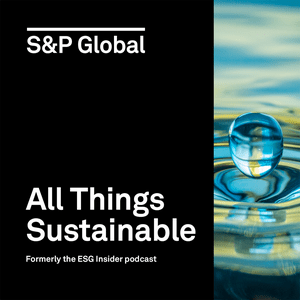In this episode of the All Things Sustainable podcast, we explore the geopolitical and macroeconomic issues impacting sustainability, energy and climate strategies in 2026.
We speak to Carlos Pascual, Senior Vice President and Head of Geopolitics and International Affairs at S&P Global Energy and a former US Ambassador to Mexico and Ukraine.
Carlos describes a fragmented geopolitical landscape marked by significant uncertainty about the direction of global climate policy, action and finance — leaving progress largely in the hands of the private sector.
"We have huge changes ahead and look for the private sector to have to play a much more central role in the overall momentum on clean technology and investments in renewable energy," Carlos says.
We speak to S&P Global Ratings Global Chief Economist Paul Gruenwald to understand the macroeconomic factors influencing sustainability. Paul says AI is the dominant story for 2026.
"We're seeing great numbers out of data center and AI-related investment, but almost everything else is flat," Paul tells us.
To understand the outlook for climate change and the growing importance of adaptation alongside mitigation efforts, we speak to Dr. Terence Thompson, Chief Science Officer at the S&P Global Climate Center of Excellence. He explains how advances in climate science are helping to better understand the probability of climate hazards.
"Getting at that probability is really key to making those kinds of very practical decisions about how do we allocate limited resources to cope with climate change and adapt to it," Terence says.
And to understand the outlook for the energy transition, we speak to Roman Kramarchuk, Head of Integrated Narratives and Policy Analytics at S&P Global Energy. Roman explains how the world is balancing growing energy demands with sustainability priorities in an increasingly fractured global landscape.
"There's a big regional story here, and this is a regional story that plays out both in the technology, in the supply chains, and in the geopolitical side," Roman says.
Read S&P Global's Top 10 Sustainability Trends to Watch in 2026 | S&P Global
Read The Copper Conundrum: Why Meeting AI-Era Electrification Demands Is a Race Against Time
Listen to a replay of the Jan. 29 webinar: Sustainability Nexus: S&P Global's Top 10 Sustainability Trends to Watch in 2026
This piece was published by S&P Global Sustainable1 and not by S&P Global Ratings, which is a separately managed division of S&P Global.
Copyright ©2026 by S&P Global
DISCLAIMER
By accessing this Podcast, I acknowledge that S&P GLOBAL makes no warranty, guarantee, or representation as to the accuracy or sufficiency of the information featured in this Podcast. The information, opinions, and recommendations presented in this Podcast are for general information only and any reliance on the information provided in this Podcast is done at your own risk.
Any unauthorized use, facilitation or encouragement of a third party's unauthorized use (including without limitation copy, distribution, transmission or modification, use as part of generative artificial intelligence or for training any artificial intelligence models) of this Podcast or any related information is not permitted without S&P Global's prior consent subject to appropriate licensing and shall be deemed an infringement, violation, breach or contravention of the rights of S&P Global or any applicable third-party (including any copyright, trademark, patent, rights of privacy or publicity or any other proprietary rights).
This Podcast should not be considered professional advice. Unless specifically stated otherwise, S&P GLOBAL does not endorse, approve, recommend, or certify any information, product, process, service, or organization presented or mentioned in this Podcast, and information from this Podcast should not be referenced in any way to imply such approval or endorsement. The third party materials or content of any third party site referenced in this Podcast do not necessarily reflect the opinions, standards or policies of S&P GLOBAL. S&P GLOBAL assumes no responsibility or liability for the accuracy or completeness of the content contained in third party materials or on third party sites referenced in this Podcast or the compliance with applicable laws of such materials and/or links referenced herein. Moreover, S&P GLOBAL makes no warranty that this Podcast, or the server that makes it available, is free of viruses, worms, or other elements or codes that manifest contaminating or destructive properties.
S&P GLOBAL EXPRESSLY DISCLAIMS ANY AND ALL LIABILITY OR RESPONSIBILITY FOR ANY DIRECT, INDIRECT, INCIDENTAL, SPECIAL, CONSEQUENTIAL OR OTHER DAMAGES ARISING OUT OF ANY INDIVIDUAL'S USE OF, REFERENCE TO, RELIANCE ON, OR INABILITY TO USE, THIS PODCAST OR THE INFORMATION PRESENTED IN THIS PODCAST.


